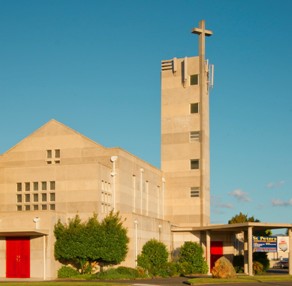
In a preachment last Sunday, John (Freebairn) used the term ‘mass’ on several occasions. Although the term ‘Mass’ is commonly used in many Anglican parishes, there are still for some people, echoes of something perhaps Romanish. Those feelings need to be addressed because they tend to based on miss-understandings rather than facts. Those miss-understandings work a little like a veil which conceals a deeper and vital truth.
In a straight clip from Wikipaedia, the following etymology is explained.
The English noun mass is derived from Middle Latin missa. The Latin word was adopted in Old English as mæsse (via a Vulgar Latin form *messa), and was sometimes glossed as sendnes (i.e. 'a sending, dismission'). The Latin term missa itself was in use by the 6th century. It is most likely derived fromthe concluding formula Ite, missa est ("Go; the dismissal is made");1 missa here is a Late Latin substantive corresponding to classical missio.
As the footnote makes clear, the term ‘Mass’ points both backward and forward. It points forward in the sense that it becomes an instruction, usually delivered by the deacon, for the congregation to go out into the world and share in the mission of the Church. It points backward in the sense that it follows a time of sacred sharing. It affirms the traditional understanding that understands the Anaphora, not just as a form of memorial, but in deed, are-enactment of the last supper. Though not supported by it’s etymology, the word anamnesis is frequently understood as a recreation in which Jesus himself is present in the breaking of the bread. However we interpret the words, the event is a time in which we all affirm the central truth that gathers us. In the act of partaking in the divine meal, we become one. It is that one-ness that we take into the world in mission.
These however, are the words of the faithful. A simpler set of words and perhaps a metaphor may help with task of lifting the veil.
First, a metaphor. Within the next week, most folk will gather in family groups to celebrate Christmas. Without dwelling on the content of that celebration, this is a time when families gather to re-affirm their bonds and create new chapters in their whakapapa. (Their family story.) This is ‘kinship’ bonding.
In the Eucharist, a similar thing happens, but this time, the bonding is called ‘spiritual bonding’. We need to recall that right at the heart of our Raison d'être is the reality that our ultimate end, is reconciliation with God, and with each other. Because, as a people, we generally separated from God and ‘scattered in the wilderness’ our missionary task is to echo Paul’s word in Romans 8 and recognise :
22 For we know that the whole creation has been groaning together in the pains of childbirth until now. 23 And not only the creation, but we ourselves,who have the first-fruits of the Spirit, groan inwardly as we wait eagerly for adoption as sons, the redemption of our bodies. 24 For in this hope we were saved.
What all this comes down to is this. When we hear the word ‘Mass’, we should not be distracted by some kind of eclectic understanding. We should rather hear an invitation to be commissioned for the service of mission in the world. The task of mission, is the gather of God’s family into a spiritual bond that affirms God as our creator. Because we are human (and therefore in need of gathering) we will all tend to lean towards different ways of engaging this commissioning. Here at St Peter’s we have a somewhat traditional practice, however, vestments and liturgical presence are merely symbolic images that we use to express the deeper truth. The crucial thing, is that whether the Deacon declares, “This is the Mass” (Go now and gather the lost) or alternatively uses the dismissal sentences from our modern liturgies, the same images should leap into our minds. We have been commissioned. We need to go and get on with the job.
Soli Deo Gloria
Ross, Advent 3+2 2019
Download: The Mass (opens as a PDF)

8:00am Holy Communion (BCP)
10:00am Eucharist (ANZPB)
10:00am Zoom Service
5:00pm Taizé Service
Fisherfolk Newsletter & Pew Sheet
The Messenger
2023-2024 Lectionary Year B [PDF]
Church & Hall Hire
April 2024 Roster
Online Worship Resources
Past Sermons
St Peter's Blog
April 26 - St Mark the Evangelist
April 26 - Daily Office
April 24 - Toyohiko Kagawa
April 23 - St George of England
April 21 - Fourth Sunday of Easter
April 21 - St Anselm
April 14 - Third Sunday of Easter
229 Ruahine Street,
Palmerston North
Email: stpeters@inspire.net.nz
Phone: (06) 358 5403
Office Hours
Tuesday to Friday
9:00am to 12:00pm
Closed on Public Holidays